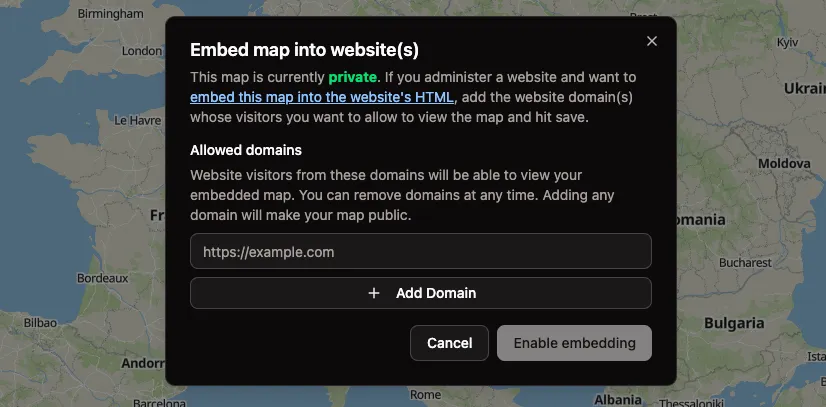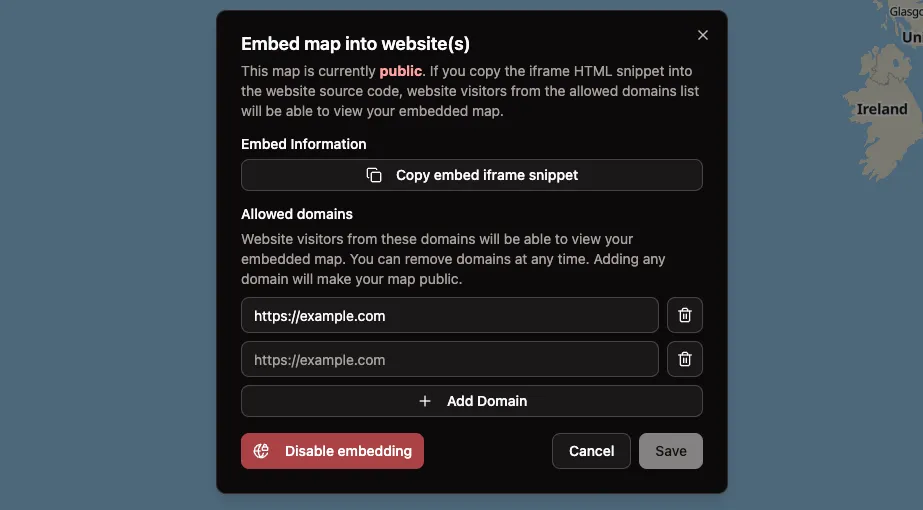Embedding maps into websites
You can embed any map made with Mundi (manually or created via API) into your website, both on Mundi cloud and open source Mundi.
Map embeds are via iframe tags and present a read-only view of the map, zoomed to the data that’s loaded.
Embedding maps from Mundi cloud
Section titled “Embedding maps from Mundi cloud”Exposing maps to third-party websites is done using the Embed into website button at the top right of the layer list widget.

This will bring up a window that asks you to list your allowed domains.

Listing allowed domains
Section titled “Listing allowed domains”To make the map accessible to your website, let’s say you’re hosting a page on https://example.com/foo/bar.
We’ll add https://example.com to the allowed domains list. Then, any page on that domain can embed
the map. The http:// and https:// must correctly match. Catch-all domains like *.example.com are
not supported.

You can then copy the iframe HTML snippet into your website source code wherever you want the map to appear, and edit the width and height attributes accordingly. The iframe snippet will look like this:
<iframe src="https://app.mundi.ai/api/projects/embed/v1/YOUR_PROJECT_ID.html" width="800" height="600" frameborder="0"></iframe>If you want to undo this, you can hit the Disable embedding button at any time, which will lock all third-party users out of the map.
Embedding maps from self-hosted
Section titled “Embedding maps from self-hosted”When running self-hosted Mundi, embedding maps is done globally across all maps using environment variables.
Allow requests from external domains
Section titled “Allow requests from external domains”The first step to allow web browsers to load a map embedded into another website’s domain is to
add the domain to the MUNDI_EMBED_ALLOWED_ORIGINS environment variable. You can find environment
variables in the docker-compose.yml file.
--- a/docker-compose.yml+++ b/docker-compose.yml@@ -41,6 +41,12 @@ services: - REDIS_PORT=6379 - OPENAI_API_KEY=$OPENAI_API_KEY+ - MUNDI_EMBED_ALLOWED_ORIGINS=https://example.com,http://secondwebsite.org command: uvicorn src.wsgi:app --host 0.0.0.0 --port 8000MUNDI_EMBED_ALLOWED_ORIGINS accepts a comma-separated list of domains with HTTP or HTTPS (no comma if just one).
Domains added here will be allowed to embed maps from your Mundi instance.
Creating the iframe
Section titled “Creating the iframe”On your target website HTML, you can embed a given map project like so:
<iframe src="https://YOUR_MUNDI_INSTANCE/api/projects/embed/v1/YOUR_PROJECT_ID.html" width="800" height="600" frameborder="0"></iframe>Here, you’ll replace YOUR_MUNDI_INSTANCE with wherever you’re hosting Mundi along with
YOUR_PROJECT_ID with the project ID of the map you want to embed.
If you have open a map project in Mundi, the URL might look like localhost:8000/project/PZmyKibVZCb3.
The project ID is PZmyKibVZCb3 in this case and uniquely identifies the map project.